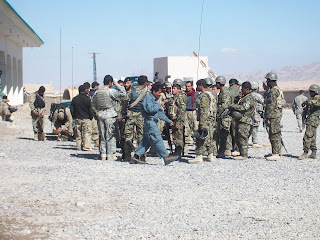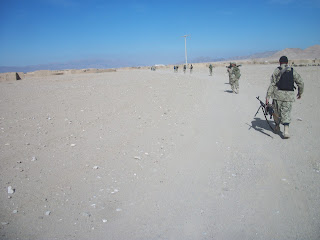So I was looking at my blog and realized that I had only added a few photos over the entire deployment. That was due to several causes, not least being the lack of a high powered internet. So I decided to add another slide show. This one has 50 photos from my time here. I think I've published all of them on Facebook already, but for my other readers I thought you might like to see some of what I see.
When I'm out on patrol I don't always take photos, especially when things get busy. I can be a bit forgetful when I have other things to deal with. I a lot of times like to just hand my camera over to my interpreter, David, especially when we aren't talking to a lot of people. Unfortunately, he tends to take pictures mostly of me, so I have to warn him to point the camera at someone else. He apologizes, and goes back to taking more photos of me.
I chose these photos because they covered most of my time here and are good representation of what I get to see and experience everyday. One photo I wish I could add (but I can't because I don't have it) is from the Islamic New Year's feast yesterday. Wow, was that food good. The guards here at my base were very proud to serve us food, and even though it was their holiday, they insisted we get food first before they would rest and eat. It was a pretty funny sight seeing other Soldiers come in with a message for the commander and get pulled into dinner. The Afghans would rush over to the serving table and bring back a huge tray of rice, french fries (I know), chicken, lamb, a delicious salsa, and fruit and vegetables. And of course naan bread. Afghan hospitality is truly a good experience.
That's all I've got for today. Reference my last post for what I have to go do now.
When I'm out on patrol I don't always take photos, especially when things get busy. I can be a bit forgetful when I have other things to deal with. I a lot of times like to just hand my camera over to my interpreter, David, especially when we aren't talking to a lot of people. Unfortunately, he tends to take pictures mostly of me, so I have to warn him to point the camera at someone else. He apologizes, and goes back to taking more photos of me.
I chose these photos because they covered most of my time here and are good representation of what I get to see and experience everyday. One photo I wish I could add (but I can't because I don't have it) is from the Islamic New Year's feast yesterday. Wow, was that food good. The guards here at my base were very proud to serve us food, and even though it was their holiday, they insisted we get food first before they would rest and eat. It was a pretty funny sight seeing other Soldiers come in with a message for the commander and get pulled into dinner. The Afghans would rush over to the serving table and bring back a huge tray of rice, french fries (I know), chicken, lamb, a delicious salsa, and fruit and vegetables. And of course naan bread. Afghan hospitality is truly a good experience.
That's all I've got for today. Reference my last post for what I have to go do now.











